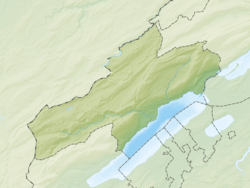Le Pâquier, Neuchâtel facts for kids
Quick facts for kids
Le Pâquier
|
||
|---|---|---|
|
||
| Country | Switzerland | |
| Canton | Neuchâtel | |
| District | Val-de-Ruz | |
| Area | ||
| • Total | 9.58 km2 (3.70 sq mi) | |
| Elevation | 895 m (2,936 ft) | |
| Population
(December 2011)
|
||
| • Total | 198 | |
| • Density | 20.67/km2 (53.53/sq mi) | |
| Postal code |
2058
|
|
| Surrounded by | Dombresson, Saint-Imier (BE), Sonvilier (BE), Villiers | |
Le Pâquier was once a small town, also known as a municipality, in Switzerland. It was located in the Val-de-Ruz district within the canton of Neuchâtel.
On January 1, 2013, Le Pâquier joined with 14 other towns. These towns included Boudevilliers, Cernier, Chézard-Saint-Martin, Coffrane, Dombresson, Engollon, Fenin-Vilars-Saules, Fontainemelon, Fontaines, Les Geneveys-sur-Coffrane, Les Hauts-Geneveys, Montmollin, Savagnier, and Villiers. Together, they formed a new, larger municipality called Val-de-Ruz.
Contents
History of Le Pâquier
Le Pâquier was first mentioned in official records in the year 1328. At that time, its name was spelled Pasquier.
Geography and Landscape
Le Pâquier covered an area of about 9.6 square kilometers (3.7 square miles). A large part of this land was used for farming. About 45.9% was for crops or pastures.
More than half of the area, 51%, was covered by forests. Only a small portion, about 2.7%, had buildings or roads. The town was located in the Val-de-Ruz valley. It was in the northeastern part of the valley, close to the road that connects Neuchâtel and Saint-Imier.
Coat of Arms
Every town in Switzerland has a special symbol called a coat of arms. Le Pâquier's coat of arms shows a green pine tree. This tree stands on a green base, all against a silver (white) background.
Population and People
In 2011, Le Pâquier had a population of 198 people. Over the ten years from 2000 to 2010, the population slightly decreased. Most people in Le Pâquier (89.6%) speak French as their main language. German was the second most common language.
In 2008, the population was made up of slightly more men (53.4%) than women (46.6%). Many people (41.1%) were born in Le Pâquier itself. Others were born in the same canton (31.2%) or elsewhere in Switzerland (19%).
About 27.3% of the population were children and teenagers (0-19 years old). Adults (20-64 years old) made up 61.5% of the population. People over 64 years old were 11.3%.
Most households in Le Pâquier had about 2.7 people living in them. There were 83 private homes in the town.
The chart below shows how the population of Le Pâquier has changed over many years:

Economy and Jobs
In 2010, the unemployment rate in Le Pâquier was low, at 1.8%. Most jobs were in the primary economic sector, which includes farming and forestry. There were 37 people working in this area.
A smaller number of people worked in the secondary sector (manufacturing) and the tertiary sector (services). The tertiary sector included jobs in sales, restaurants, and professional services.
Many residents of Le Pâquier traveled outside the town for work. For every person who came into Le Pâquier for work, about 3.7 people left to work elsewhere. Most people (58.1%) used a private car to get to work.
Religion
According to a 2000 survey, most people in Le Pâquier (63.6%) belonged to the Swiss Reformed Church. About 6.9% were Roman Catholic. Some people belonged to other Christian churches. About 18.6% of the population did not belong to any church.
Education
In Le Pâquier, many adults had completed higher education. About 29.9% had finished upper secondary education. Another 13.9% had gone on to university or a similar higher education school.
In the canton of Neuchâtel, children usually attend two years of non-mandatory kindergarten. After that, they have five years of mandatory primary school. For secondary school, students often travel to larger schools outside their home town.
Le Pâquier's kindergarten was shared with the nearby towns of Dombresson and Villiers. In the 2010-2011 school year, there were 50 kindergarten students across these towns. Le Pâquier also had one primary school class with 16 students.
In 2000, 13 students came to Le Pâquier for school from other towns. At the same time, 28 students from Le Pâquier went to schools in other towns.
See also
 In Spanish: Le Pâquier (Neuchâtel) para niños
In Spanish: Le Pâquier (Neuchâtel) para niños




